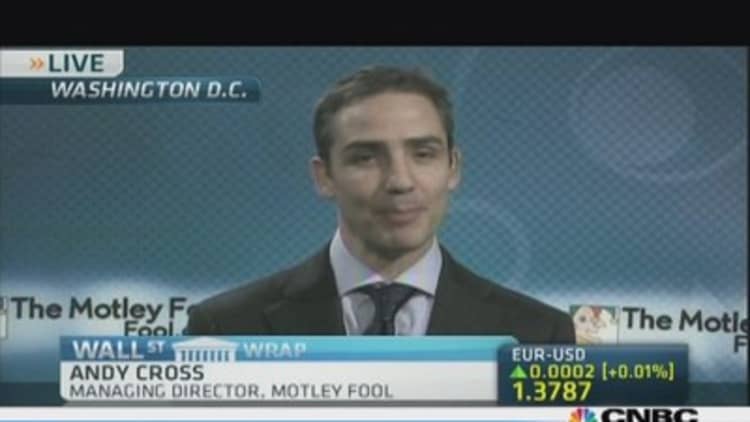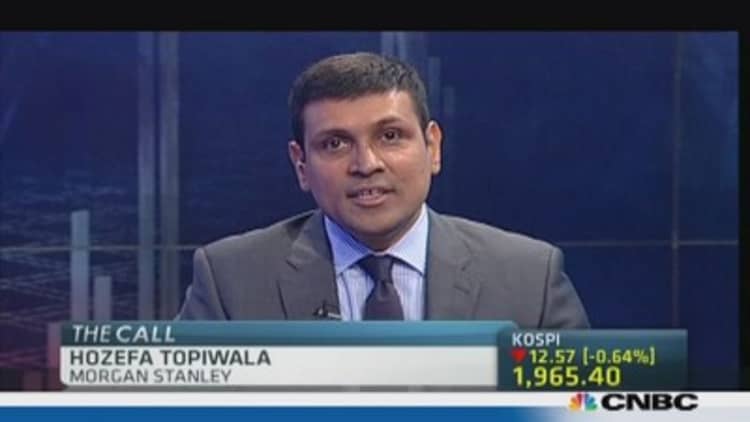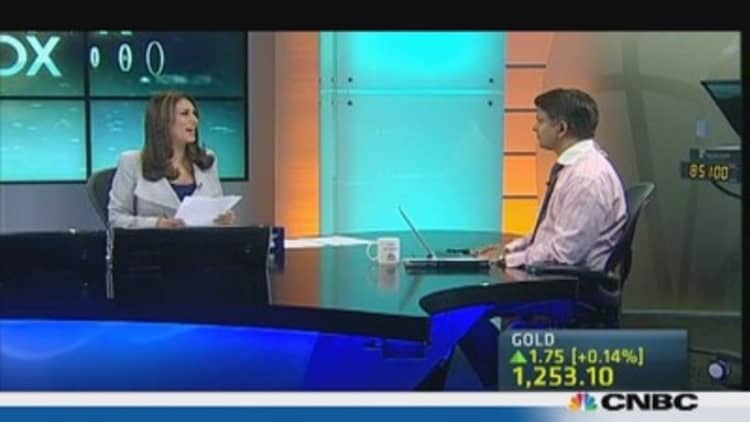Asian equity markets followed their Wall Street counterparts lower on Thursday amid speculation that the Federal Reserve could pull back on its stimulus program soon.
U.S stocks dropped sharply for a second session overnight, with the and seeing their biggest losses in nearly five weeks, after Washington's budget deal increased expectations that the Federal Open Market Committee (FOMC) will take action to curb bond purchases at next week's policy meeting.
Meanwhile, Dow stocks futures fell 40 points in afternoon trade. "Reports that Stanley Fischer potentially being nominated for the Vice-chair of the Fed could be having an impact, given he has said before that he opposes adjusting the Fed's forward guidance with regards to raising the threshold for putting up the funds rate," said Chris Weston, market strategist at IG.
(Read more: Uncovering Europe and Asia's top shorts)
Nikkei sheds 1.1%

Japan's Nikkei hit a one-week low, extending its losses into a third session, thanks to declines in weighed down by big-cap stocks even as the yen resumed its decline. The currency moved closer towards the key 103 handle after hitting a session high of 102.35 per dollar.
Among exporters, Nikon lost 2 percent while Sharp and Panasonic eased over 1 percent each.
Amid the top losers, Apple supplier Nitto Denko slumped 19 percent after cutting its operating profit forecast for the year through March while Yahoo Japan lost 3 percent as investors booked profits. The stock has rallied 13 percent this week alone.
(Read more: Quiet rally takes this Asian market to record highs)
Sydney down 0.8%
Australia's benchmark fell to a new four-month closing low, ending below its simple 200-day simple moving average (SMA) of 5,103 points for the first time since July.
Upbeat data was unable to boost sentiment. 21,000 jobs were created in November, more than double estimates for a 10,000 gain but analysts were quick to dismiss the report.
(Watch: 10% upside for Aussie stocks in 2014: CIMB)
This [jobs report] is more likely to be statistical noise than the start of a jobs recovery. Forward looking indicators such as the ANZ job ads survey and various business surveys, a 0.7% fall in hours worked and a rise in unemployment to 5.8% all indicate that the jobs market is still weak," said Shane Oliver, head of investment strategy and chief economist at AMP Capital
Global miner Rio Tinto skidded 1 percent after telling investors it would prioritize cutting its debt burden in 2014 before returning cash to shareholders.
New Zealand's stock index was little changed after the central bank held its cash rate steady at 2.5 percent and re-affirmed expectations of a rate hike next year.

Emerging markets in focus
Philippine shares closed down 2 while Indonesia's Jakarta Composite closed down 1.39 percent ahead of their respective central bank decisions. No major changes to policy are expected from either.
India's benchmark BSE Index closed down 1.22 percent - its biggest single day percentage fall since November 21 - ahead of November inflation data, which is expected to show consumer prices jumping an annual 10 percent. The data comes one day after Reserve Bank of India chief Rajan stressed that tacking inflation remains his top priority.
(Read more: India's November exports up 5.86% on-year)
Sentiment also fell after Bank of America Merrill Lynch said they expect the benchmark Sensex to head to 19,000 to 19,500 in early 2014, which is nearly 10 percent lower from its current level of 21,040.
Shanghai flat
Mainland shares closed at a new two-week low for a second straight session as investors awaited updates from the government's annual Central Economic Work Conference (CEWC), which began on Tuesday.
Banks are in focus after November new bank loans and total social financial aggregate, which includes the shadow banking sector, beat estimates. Agricultural Bank of China eased 0.8 percent while ICBC slipped 0.5 percent.
(Read more: 8.6% China growth? What's Deutsche 'smoking?')
"It raises questions why the rapid loan growth is not generating even stronger economic activity and raises risks that China may tighten financial conditions further to control excessive credit growth with potential negative consequences for the economy," said Greg Gibbs, senior FX strategist of Markets and International banking at RBS.

In Hong Kong, bad debt manager Cinda Asset Management surged as much as 24 percent in its debut.
(Watch: Is the appetite for Chinese IPOs on the mend?)
Kospi 0.5% lower
South Korean shares hit a new one-month closing low for a second consecutive session after the Bank of Korea held its base rate steady at 2.5 percent, as widely expected. Officials warned increased volatility in the yen still posed considerable risk to the local economy.
Large-cap stocks continued to be sold-of with Samsung Electronics and steelmaker Posco down 0.7 percent each.
Indian-owned vehicle maker Ssangyong Motor fell 3 percent after saying it expects to invest nearly a $1 billion on its line-up.
— By CNBC.com's Nyshka Chandran. Follow her on Twitter @NyshkaCNBC

